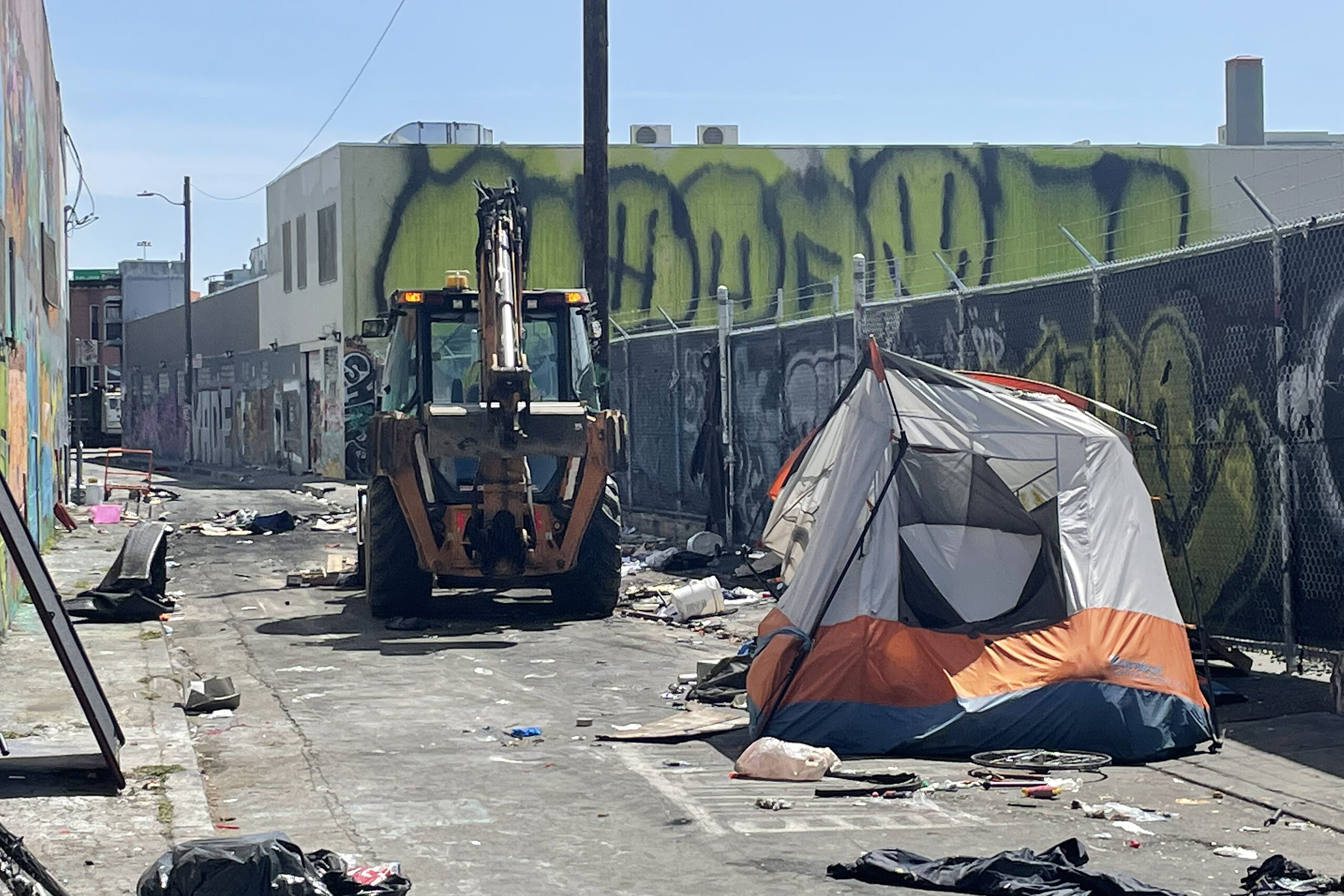City workers used a bulldozer to destroy a homeless encampment in a San Francisco alleyway after a fire, enraging activists in a move that they say defied a federal court order restricting encampment sweeps.
Two days after a camp stove ignited an encampment fire on Erie Street near the Central Freeway overpass, members of the San Francisco Police Department, Department of Public Works, City Attorney’s Office, Department of Emergency Management and SF Fire Department arrived at the tent hotspot near Downtown for what one city worker described to The Standard as a routine outreach and cleaning operation.
However, the presence of a bulldozer struck some local homeless activists as anything but routine.
“A bulldozer? Are you freaking kidding me?” said Couper Orona, a formerly homeless firefighter who now works as a medic for people living on the street. “I’m blown away at the callousness and total disrespect of human lives and belongings.”
The Department of Emergency Management said that the encampment was cleared on Tuesday due to multiple fires, an overflow of items that blocked the sidewalk and because trash trucks use the alley as thoroughfare. The department said that it engaged with six people, two of whom entered shelter.
Due to a federal ruling in December, the city is restricted from conducting encampment sweeps, though agencies can still ask people to move temporarily for street cleaning. But one of the many legal questions currently in dispute is whether the city can sweep encampments if their occupants refuse shelter.
Earlier this month, Mayor London Breed called the injunction “ridiculous,” claiming that it’s inhibiting the city from making progress on homelessness. Likewise, City Attorney David Chiu argued that the ruling puts the city in an “impossible situation,” filing an appeal with the Ninth Circuit Court of Appeals that will be considered in the coming months.
However, activists contend that the city wouldn’t need to force people to move if they were offered dignified places to live. An attorney for the Coalition on Homelessness, which sought the injunction, argued that the city is relying on hypothetical arguments to distract from its shortage of housing and shelter.
A recent analysis found that the city is 2,250 shelter units and 3,810 housing units short of solving unsheltered homelessness locally. Around 20,000 people experience homelessness in the city over the course of a year, according to the most recent count.
Jen Kwart, a spokesperson for the City Attorney’s Office, didn’t address Tuesday’s operation specifically but said in a statement that the city is continuing to comply with the federal injunction.
Kwart said that the city’s “bag and tag policy,” which ostensibly provides a path for homeless people to retrieve their confiscated items, allows for specific instances in which city workers can legally dispose of people’s property.
However, some former occupants of the disassembled Erie Street encampment were doubtful that items will be returned to them.
A woman named Krystel Erickson said she returned to her encampment on Erie Street Tuesday to find that her tent and all of her belongings were gone.
Erickson said she wasn’t aware that the city was planning to clear the encampments and that she wasn’t offered shelter or housing. There were two notices for the encampment clearing stapled to a telephone pole in the middle of the alley on Tuesday, but both were written in Spanish.
Without housing or shelter, Erickson said she was forced to spend the night at a friend’s tent, left with only the clothes on her back.
“All the forward momentum a person could have going out here becomes completely halted,” Erickson said. “Every time it happens it’s like, ‘Oh my God, really, again?’”
Another man, who gave the name JD, said he had recently acquired a housing placement in the city and he was in the process of moving his remaining possessions into storage. If it weren’t for his friend, who happened to be present during the city’s operation and guarded many of the items, JD said he feared that all of his belongings would’ve been trashed.
“I thought I got robbed,” JD said. “It’s gotten to the point where, really, what can we do?”
A notice was taped to a nearby wall indicating that the city had seized a blue tent, black bags full of personal belongings and a flat-screen TV, which could be retrieved at a Department of Public Works operations yard.
“Find me one person who actually got their stuff back after the city took it,” JD said.
During the encampment clearing, a couple named Ryan and Kaya refused to move their encampment and, at one point, got into an argument with a city employee over what items could be thrown away. The couple had previously refused to move during a January encampment operation that took place as the city experienced historic rainfall.
“This is my stuff,” Ryan said to the employee.
“That’s not your stuff,” the worker replied, asking the police to intervene.
Ryan said that the city had offered them a spot at a city-sanctioned tent site, but they declined because they were only allowed to bring two bags worth of personal items. A representative from the fire department said that the couple had until Friday to move their encampment, which stretched along the sidewalk for about 40 feet.
Ryan said that they are on a waitlist for housing and are aiming to move their items into storage before the city’s Friday deadline.
“This shit hurts,” Ryan said. “I understand we’re living outside, but what if they came and did this to your house?”
